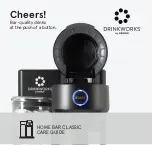
45
Models
Revision 02-2000
Toucan 1010
5.10 Hydraulic system
Exercise extreme care around pressurized
hydraulic systems. Do not work on a hydraulic
system while it is in operation or until all
pressure is released.
Cleanliness
Contaminants in a hydraulic system affect operation
and will result in serious damage to the system
components. Dirty hydraulic systems are a major
cause of component failures.
Keep the system clean
When removing components of a hydraulic system,
cover all openings on both the component and the
work platform.
If evidence of foreign particles is found in the hydraulic
system, flush the system.
Disassemble and assemble hydraulic components on
a clean surface.
Clean all metal parts in a non-flammable cleaning fluid.
Then lubricate all components to aid in assembly.
Hydraulic filters location
Pressure filter
Pressure filter is located
on the front left hand
side of the chassis.
Return filter
The top in-tank return filter
is located at the rear of the
chassis.
Sealing elements
Inspect all sealing elements (O-rings, gaskets, etc,...)
when disassembling and assembling hydraulic system
components. Installation of new elements is always
recommended.
Hydraulic lines
When installing metal tubes, tighten all bolts finger-
tight. Then, in order, tighten the bolts at the rigid
end, the adjustable end and the mounting brackets.
After tubes are mounted, install the hoses. Connect
both ends of the hose with all bolts finger-tight.
Position the hose so that it does not rub on the
machine and can bend and twist. Tighten bolts in
both couplings.
Due to manufacturing methods there is a natural
curvature to a hydraulic hose. The hose should be
installed so any bend is with this curvature.
Removing air from the hydraulic system
Air entering the hydraulic oil will normally be removed
automatically with the hydraullic oil passing in the
reservoir. However, if a component has been replaced
or the reservoir level is too low, air can enter the
system. If air becomes entrapped in the hydraulic
oil, it may be detected by noisy operation of the pump/
motor-operated components. Should this occur,
check the level of the hydraulic reservoir and
replenish as necessary.
Minute leaks may be difficult to locate. Should you
encounter a leak that is not readily detectable, use
the following method when checking for leaks :
- Seal all normal openings in the hydraulic
system and the hydraulic reservoir.
- Using a positive means to control the pressure
(i.e. a regulator), pressurize the hydraulic
system to 13.8 kPa/0.14 bar - 27.5 kPa/0.28
bar.
- Inspect all joints and fittings for evidence of
leaks. A soap solution - may also prove helpful
in detecting minute leaks when the system is
pressurized.
- Remove the pressure, repair any leaks found
and reopen any openings (vents, etc...) closed
for inspection.
- Refill the hydraulic reservoir after completing
any repairs or service.
- Operate all hydraulics circuits several times
in both directions. This action should return
any entrapped air to the hydraulic reservoir
where it can be removed from the hydraulic
oil by the hydraulic reservoir vent.
Use extreme care when removing any plugs
or restrictions from a hydraulic system
suspected to have entrapped air that may be
pressurized. Failure to comply could result
in death or injury to personnel.
DANGER
Pressure filter
Return filter
DANGER
MAINTENANCE
5
5
Summary of Contents for toucan 1010
Page 1: ...SERVICE MANUAL Revision 02 2000 MA 0235 01 English Toucan 1010 I...
Page 2: ......
Page 3: ...3 Models Revision 02 2000 Toucan 1010 MA0235 01 Models Toucan1010 _____ Toucan1010 I _____...
Page 8: ......
Page 18: ......
Page 20: ......
Page 26: ......
Page 38: ......
Page 40: ......
Page 64: ......
Page 68: ......
Page 69: ...69 Models Revision 02 2000 Toucan 1010 LUBRICATION 7 7 1 Lubrication points TABLE OF CONTENTS...
Page 70: ......
















































